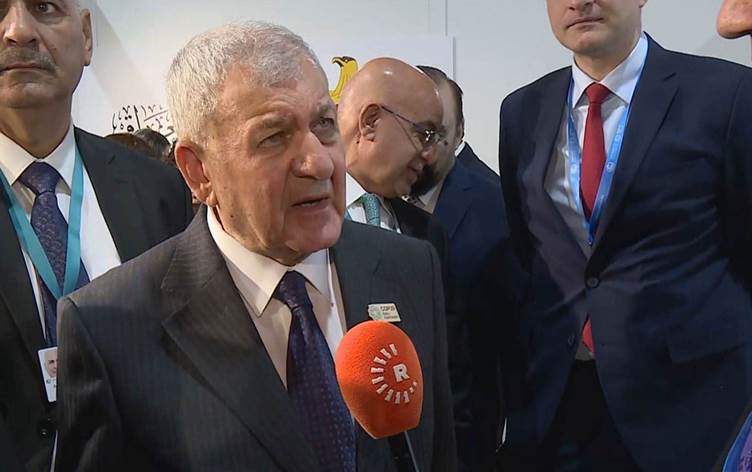
ERBIL, Kurdistan Region – Iraq’s President Abdul Latif Rashid on Wednesday warned of escalating natural disasters citing “frequent droughts, floods, and rising temperatures” impacting all parts of the country due to climate change.
“Climate has changed, and there have been floods in some places where it never happened before. Unfortunately, the temperatures are rising. We have been experiencing drought in all parts of Iraq in recent years,” Rashid told Rudaw’s Sangar Abdulrahman on the sidelines of COP29 climate summit in Baku, Azerbaijan.
“As you know the population on earth is growing and the available resources are limited in terms of energy, water, and other things,” Rashid added, warning that “disaster may occur should we deal with those resources in an unproductive manner.”
The Iraqi president’s remarks came as he was wrapping up his third day activities at the COP29 held in Baku where leaders and heads of states of more than 190 countries are discussing ways to confront climate effects.
While climate change is a global problem, Iraq in particular is more vulnerable to its effects, as it was ranked fifth among countries most vulnerable to climate breakdown in a 2022 report by the International Organization of Migration (IOM).
Additionally, it is ranked 61st out of 163 countries on UNICEF’s Children’s Climate Risk Index. By 2050, water availability is expected to drop by 20 percent, which could lead to the loss of nearly one-third of Iraq’s irrigated land.
During a speech at COP29 on Tuesday, the Iraqi president said that climate change has also displaced historic heritage communities in Iraq, with its effects now clearly felt across the country.
“The changes in climate have led to the displacement of traditional and historic communities, such as the inhabitants of the marhslands in southern Iraq, which is listed among world heritage sites, and their traditions face the danger of extension,” Rashid said.
Iraq is one of the world’s most oil-rich countries that’s grappling with climate effects, and has impacted all aspects of life in the country.
Three out of five children do not have access to safely-managed water services in Iraq, the UN Children’s Fund (UNICEF) stated in a report in 2021.
With 54% of the population considered food vulnerable, desertification, droughts, and soil salinization are already disrupting supply chains in Iraq, increasing costs and worsening poverty across the country.
